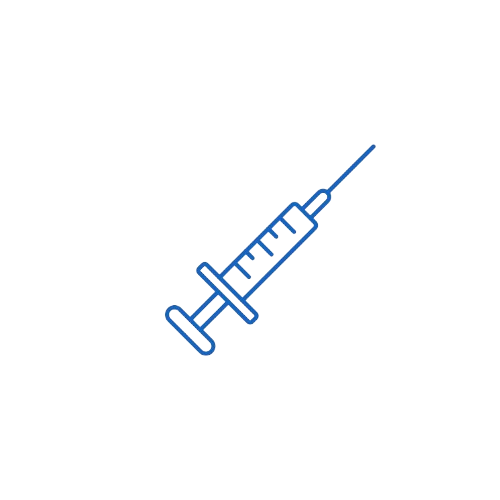Polysaccharide Pneumococcal Vaccine
Medicines List
All MedicineIndications
Approved Indications:
- Active immunization for the prevention of pneumococcal disease caused by Streptococcus pneumoniae serotypes included in the vaccine (23 serotypes).
- Recommended for all adults aged 65 years and older.
- Recommended for individuals aged 2 years and older who are at increased risk of pneumococcal disease due to certain medical conditions or risk factors, including:
- Chronic heart disease (excluding hypertension)
- Chronic lung disease (including chronic obstructive pulmonary disease and asthma)
- Chronic liver disease (including cirrhosis)
- Diabetes mellitus
- Alcohol use disorder
- Cigarette smoking
- Functional or anatomic asplenia (e.g., sickle cell disease, splenectomy)
- Immunocompromising conditions such as HIV infection, leukemia, lymphoma, Hodgkin’s disease, generalized malignancy
- Chronic renal failure or nephrotic syndrome
- Solid organ transplant recipients
- Patients receiving immunosuppressive therapy (e.g., chemotherapy, long-term corticosteroids)
Limitations:
- Not indicated for children under 2 years — this age group should receive pneumococcal conjugate vaccines (e.g., PCV13, PCV15, PCV20) instead, which provide better immunogenicity in young children.
Dosage & Administration
Adults ≥65 years:
- Standard dose: 0.5 mL administered as a single IM or deep subcutaneous injection.
- Adults who received PPSV23 before age 65 should receive one additional dose at age 65 or later, if at least 5 years have passed since their previous dose.
Children and adults aged 2–64 years at increased risk:
- Standard dose: 0.5 mL IM or subcutaneous injection.
- A one-time revaccination is recommended 5 years after the first dose for certain high-risk groups (e.g., functional or anatomic asplenia, immunocompromised states).
Route and site:
- Administer intramuscularly (preferred) or deep subcutaneous injection.
- Adults: Deltoid muscle is preferred.
- Young children: Anterolateral thigh may be used if needed.
Co-administration:
- May be given at the same visit as inactivated influenza vaccine or other vaccines, but separate syringes and injection sites must be used.
Mechanism of Action (MOA)
PPSV23 is a polyvalent vaccine containing purified capsular polysaccharides from 23 of the most common or invasive Streptococcus pneumoniae serotypes. These polysaccharide antigens stimulate a B-cell–mediated, T-cell–independent immune response, resulting in the production of serotype-specific opsonizing antibodies. These antibodies enhance phagocytosis and clearance of the bacteria by immune cells, reducing the risk of invasive pneumococcal diseases such as pneumonia, bacteremia, and meningitis. Because it does not produce a strong T-cell response, it does not generate long-lasting immunologic memory in young children, which is why conjugate vaccines are used for those under 2 years of age.
Pharmacokinetics
Traditional pharmacokinetic parameters (absorption, distribution, metabolism, excretion) do not apply to vaccines. Relevant immunologic information:
- Onset of protection: Protective antibody levels generally develop within 2–3 weeks after vaccination.
- Duration of immunity: Antibody levels persist for at least 5 years in most healthy adults, but may decline sooner in elderly or immunocompromised individuals.
- Immunologic memory: Limited, which is why revaccination may be recommended in certain high-risk groups.
Pregnancy Category & Lactation
Pregnancy:
- No assigned FDA pregnancy category. Limited data show no evidence of harm to the fetus if PPSV23 is administered when clearly indicated during pregnancy (e.g., high-risk conditions). Routine vaccination during pregnancy is not recommended unless indicated.
Lactation:
- Safe for breastfeeding mothers. Vaccine antigens are not known to cause harm to breastfed infants.
Therapeutic Class
- Class: Inactivated bacterial vaccine
- Subclass: 23-valent pneumococcal polysaccharide vaccine
Contraindications
- Severe allergic reaction (e.g., anaphylaxis) to any component of the vaccine or a prior dose of PPSV23.
- Moderate or severe acute illness with or without fever — vaccination should be postponed until recovery.
Warnings & Precautions
- Does not protect against pneumococcal serotypes not included in the vaccine.
- Does not treat active pneumococcal infection.
- Limited immune response in immunocompromised patients; protective efficacy may be reduced.
- May cause increased local and systemic reactions if given multiple times at short intervals — unnecessary revaccination should be avoided.
- Pneumococcal conjugate vaccines (e.g., PCV13, PCV15, PCV20) are preferred for children under 2 years for better immunogenicity.
Side Effects
Common:
- Local reactions: Pain, redness, swelling, induration at injection site (up to 50% of recipients).
- Systemic reactions: Mild fever, fatigue, myalgia.
Serious or Rare:
- Hypersensitivity reactions (very rare, but possible anaphylaxis).
- Severe local reactions (e.g., injection site cellulitis, sterile abscess — rare).
- Febrile seizures: Extremely rare, and mostly relevant to younger children (who should receive conjugate vaccines instead).
Drug Interactions
- Immunosuppressive therapy (e.g., chemotherapy, radiation, corticosteroids): May reduce vaccine-induced antibody response.
- Other vaccines: Can be administered with other inactivated vaccines at separate sites. If live vaccines are needed, follow general guidelines for spacing if indicated.
Recent Updates or Guidelines
- Latest CDC and WHO recommendations encourage sequential use of pneumococcal conjugate vaccines followed by PPSV23 for certain high-risk adults to broaden serotype coverage.
- Newer conjugate vaccines with additional serotype coverage (e.g., PCV15, PCV20) are gradually replacing PCV13 in many settings but PPSV23 remains recommended for serotypes not covered by PCVs.
- No major changes in storage, dosing, or administration requirements in recent updates.
Storage Conditions
- Store refrigerated at 2°C to 8°C (36°F to 46°F).
- Do not freeze — discard if vaccine has been frozen.
- Keep in original packaging to protect from light.
- Use only if the solution is clear and free from particles or discoloration.
